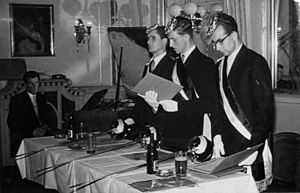Commercium facts for kids
A commercium is a special traditional gathering held by university students, mostly in Central and Northern Europe. In German, it's called a Kommers or Commers. Today, student groups called fraternities still organize these events. You can find them in countries like Germany, the Baltic states, and Poland.
At a commercium, tables are often set up in a U or W shape. Students gather to sing traditional songs and enjoy non-alcoholic drinks. There are strict, old rules for these events. They can also include fun performances or music. A commercium is a more formal version of a student get-together, which is called a Kneipe in German.
Contents
What is a Commercium?
The word "commercium" comes from the French word Commerce. It used to mean any lively gathering. A commercium gathering includes speeches, toasts, and songs. Sometimes, there are even planned jokes or tricks. The main drink served is often non-alcoholic.
Who organizes a Commercium?
Special officials, called Chargierte in German, manage the event. These officials are chosen by the members of the student group, known as a Studentenverbindung. These events became more formal after 1871.
Where else are Commerciums held?
In the 1800s, other German groups, like firefighters or shooting clubs (called Schützenvereine), also started holding commerciums. They still do this for special occasions today.
Special Commercium Traditions
Some unique customs are part of a commercium. One is called a salamander or Landesvater. During this, guests stand up. After finishing their drinks, they tap their glasses on the table three times.
Honoring Students
If a student passes away, their memory might be honored with a Trauercommers. This is a special commercium held to remember them.
Commerciums in Pop Culture
The operetta The Student Prince helped make German student traditions famous. This happened during a time when alcohol was not allowed in the US. The lively song "Drink! Drink! Drink!" was very popular with American theatergoers in 1924.
Commerciums in East Germany
In the final years of communist East Germany, some students started new fraternities. For example, Salana Jenensis in Jena. They organized commerciums at a place called the Rudelsburg.
Images for kids
 | Kyle Baker |
 | Joseph Yoakum |
 | Laura Wheeler Waring |
 | Henry Ossawa Tanner |





